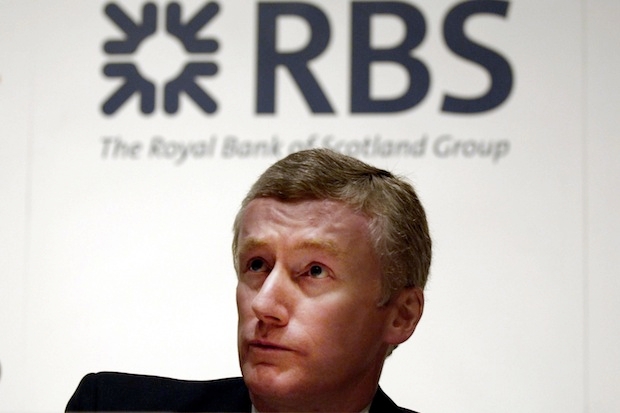When Fred Goodwin was looking for a marketing slogan in the boom years, he alighted on a simple phrase which encapsulated the ‘can-do’ philosophy of the bank he ran. RBS would, promised the adverts, ‘Make It Happen’. Goodwin and his colleagues made it happen, though not quite in the way they intended.
They turned RBS into a financial monster, the world’s biggest bank, with assets of £1.9 trillion. By 2008 it had become so large and so exposed that if boom ever turned to bust the bank (and the rest of us) would be buggered. And so it proved.
Five years ago this week, Lehman Brothers went out of business. That earthquake triggered a financial tsunami which went on to flatten RBS, which had to be rescued by taxpayers at the cost of £45.2 billion.
So what happened? I have spent two and half years investigating the story of RBS, interviewing many of the actors in this spectacular drama and asking what on earth they thought they were doing. Many of their answers involve the extraordinary behaviour of Goodwin. He was neither lazy nor inattentive. Such was his love of detail that he insisted that the company’s fleet of Mercedes be spray-painted the precise shade of RBS blue. He insisted on masterminding the production of the RBS Christmas card, hated the use of Sellotape and mandated filing cabinets with rounded tops to eliminate clutter.
Obsessed with takeovers and trivia, he paid too little attention to the old-fashioned fundamentals of banking: credit, risk, capital and liquidity. The fancy new products inside the investment banking division (which helped to destroy RBS) were a mystery to him. A preoccupied Goodwin did not want to know what he did not already know.
While examples of egregious hubris can be found in Wall Street and the City, the RBS story has a distinctly Scottish component. Goodwin’s predecessor, Sir George Mathewson, was a nationalist determined to build the world’s best bank based in Edinburgh. When he and Goodwin bought the much bigger English bank NatWest in 2000, they swooped on its London headquarters like medieval monarchs on a cross-border raiding party — shipping the contents of its wine cellar back to Edinburgh.
Goodwin was not an SNP supporter, but he was fiercely patriotic — so much so that in the mid-1990s he adorned his executive meeting room with a replica long-sword of the kind wielded by Mel Gibson in Braveheart. It chimed with the spirit of the time. Steve Rick, who helped Mathewson rebuild RBS, told me that Braveheart ‘had a lot to answer for… it gave those guys in the Scottish banks too much confidence’. And this was a decade before RBS’s calamitous acquisition of its Dutch rival ABN Amro. Then, Alex Salmond, Scotland’s First Minister, wrote to Goodwin offering ‘any assistance my office can provide’. He signed his letter with a flourish: ‘Yours for Scotland, Alex’.
This political hubris is now being quickly forgotten, as blame is piled on to the one or two bankers. Indeed, the post-crash inquest has involved a classic British establishment hit-job because it suits many others for Goodwin to take all the blame. But while he certainly made catastrophic mistakes, he was hardly a rogue trader. His way of running RBS fit an era in which banking was getting much bigger and more complex on the back of innovation. And politicians loved it. For their efforts Goodwin and others were knighted, not deplored.
Yes, Goodwin was dangerous. But the dominant ideas of that period made the disaster possible. The ‘end of boom and bust’ and the billions of CDOs stuffed with sub-prime junk all rested on a very stupid idea: the notion that we are much more sophisticated and smarter than our predecessors. For all the complexity of the crisis, the lesson of the whole experience is quite simple: conservative scepticism is essential.
Mankind is susceptible to manias and over-confidence. It was there in the South Sea bubble, or in the Darien disaster. The 2008 banking disaster was simply a remake of a very old story.
Look closely, and you can see the start of the next story. Many of the techniques that lay behind the financial crisis — the obsession with innovation, mining data, quant theory and the excessive reliance on epic computerisation — are now rife in business and politics. Politicians are, yet again, trying to manipulate the housing market with cheap mortgages. Global internet giants, with their huge resources and supreme confidence, remind me of the banks before the crash. What could possibly go wrong this time?






Comments